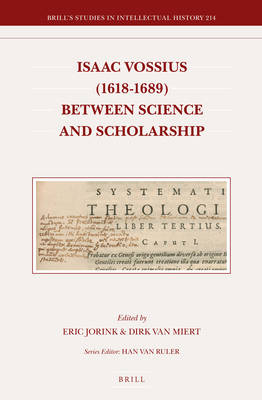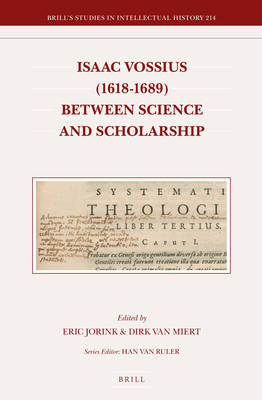
- Afhalen na 1 uur in een winkel met voorraad
- Gratis thuislevering in België vanaf € 30
- Ruim aanbod met 7 miljoen producten
- Afhalen na 1 uur in een winkel met voorraad
- Gratis thuislevering in België vanaf € 30
- Ruim aanbod met 7 miljoen producten
Zoeken
Omschrijving
Mostly remembered for his library and for his biblical criticism, Isaac Vossius (1618-1689) played a central role in the early modern European world of learning. Taking his cue from the unlikely bedfellows Joseph Scaliger and René Descartes, Vossius published on chronology, biblical criticism, optics, African geography and Chinese civilization, while collecting, annotating and selling one of the century's most precious libraries. He was appointed an early Fellow of the Royal Society, and moved in the circles which later gave rise to the Académie Royale des Sciences. Together with Christiaan Huygens, he was considered the Dutch Republic's foremost student of nature.
In this volume, a range of authors analyse Vossius' participation in the full spectrum of the Republic of Letters, much of which has sadly been written out of the history of both scholarship and science.
Contributors include: Anthony Grafton, Scott Mandelbrote, Fokko Jan Dijksterhuis, Karel Davids, Thijs Weststeijn, Colette Nativel, Susan Derksen and Astrid C. Balsem
In this volume, a range of authors analyse Vossius' participation in the full spectrum of the Republic of Letters, much of which has sadly been written out of the history of both scholarship and science.
Contributors include: Anthony Grafton, Scott Mandelbrote, Fokko Jan Dijksterhuis, Karel Davids, Thijs Weststeijn, Colette Nativel, Susan Derksen and Astrid C. Balsem
Specificaties
Betrokkenen
- Auteur(s):
- Uitgeverij:
Inhoud
- Aantal bladzijden:
- 366
- Taal:
- Engels
- Reeks:
- Reeksnummer:
- nr. 214
Eigenschappen
- Productcode (EAN):
- 9789004186705
- Verschijningsdatum:
- 26/07/2012
- Uitvoering:
- Hardcover
- Formaat:
- Genaaid
- Afmetingen:
- 157 mm x 241 mm
- Gewicht:
- 698 g

Alleen bij Standaard Boekhandel
+ 580 punten op je klantenkaart van Standaard Boekhandel
Beoordelingen
We publiceren alleen reviews die voldoen aan de voorwaarden voor reviews. Bekijk onze voorwaarden voor reviews.








